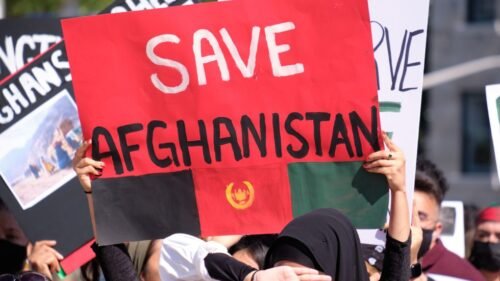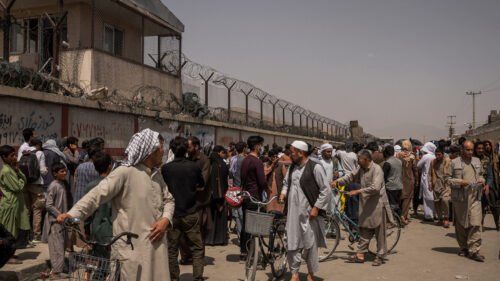Every August, the headlines return like a seasonal affliction. Editorials lament, and policy experts reappear on panels to explain, yet again, “what went wrong” in Afghanistan. Think tanks repackage their failures in fresh fonts before the spotlight shifts elsewhere: Yemen, Ukraine, Gaza. For one fleeting moment, the world pretends to remember a country it helped dismantle and then promptly forgot. Afghanistan is now an export sold as a think tank insight, recycled as a policy failure and shelved until next year’s anniversary coverage.
But for those of us who lived through the collapse, August isn’t just a month. It’s a rerun of disaster — a parade of absences. Grief in the postcolonial world rarely announces itself in headlines. It festers in what’s no longer there: the shuttered schools, the sold daughters and the stolen breath of possibility.
And from that vacuum emerged the victors: long-haired, dark-robed and triumphantly illiterate. These self-anointed “Chosen Warriors of Allah” couldn’t read, write or explain the religion they claimed to defend. But they could enforce it, with bullets, with beards and with absolute certainty. Armed with machine guns and divine delusions, they marched toward Kabul beneath a white flag. Why bother with colors when you’re already blessed?
They swept into the capital like a holy blackout, purging it of the corrupting influences of science, technology and joy. The Taliban returned education to its sacred essence: rote memorization of medieval texts, supervised under the watchful eye of a solemn Doctor of Religion unburdened by curiosity. Divine decree canceled the future.
Gender apartheid as state policy
Naturally, this sacred learning was reserved for men. Women, in contrast, were “protected”, a word that, in the Taliban lexicon, translates to imprisonment, starvation or erasure. UN Women has named this for what it is: gender apartheid.
The Taliban barred girls from secondary school, banned them from universities and expelled them from public life. Some families dress daughters as sons to smuggle them into markets; locals call it Bacha Posh (“girl dressed like a boy”). Others sell children to keep the rest alive. Marriage has become a market innovation, where poor girls are exchanged in halal contracts, a sacred fusion of piety and predation.
For boys, on the other hand, schools remain open, but the patriarchy, obsessed with lineage, control and theological purity, converted boys’ schools into indoctrination camps. These are not classrooms but assembly lines for future Taliban fighters, martyrs, traffickers and tyrants.
As Radio Free Europe documented, the Taliban have systematically transformed secular schools and teacher training centers into madrasas, prioritizing rote memorization and antimodern ideology over any form of critical or scientific learning. These young boys are taught not to think, but to obey. Not to question, but to lead others into submission.
Having been one of those “students” myself during the Taliban’s first regime, I’ve spent years pondering how to reform this model. Finally, I have found a reasonable solution: ban boys’ education entirely.
Think about it. Instead of training tomorrow’s warlords, why not redirect their potential? Send them to the fields. Let them plant literal crops instead of ideological ones. Merchants assure us that, while today’s boys may be physically soft and mentally stagnant from years of sedentary indoctrination, they can be reconditioned. With sturdy boots and early intervention, they might become useful agricultural laborers. It’s a better outcome than becoming the next wave of “trusted leaders” trained to export holy war.
Families, too, will benefit. Boys will finally contribute to the household in ways that don’t involve bullets or beards. It’s a win, win, win; the merchants get workers, families get breadwinners and society sheds the burden of toxic masculine leadership. Afghanistan moves forward, free from the weight of ideas.
A new export economy
Naturally, the regional traffickers will rejoice. They’ve always seen Afghanistan’s children as commodities. A generation of obedient, uneducated boys is a gift to the global market, pliable enough to carry cement bags or Kalashnikovs (AK-47s), depending on demand. And they’re already being shipped out.
As ABC News reports, the Taliban has begun exporting Afghan workers, particularly young men, to Qatar as a way to “ease unemployment” at home and possibly secure financial returns abroad. It’s a brilliant economic strategy: deny them education, then rent out their labor to foreign governments. The boys may not know algebra, chemistry or philosophy, but they understand orders — development through displacement, with divine approval.
Domestically, the benefits multiply. With no need for boys’s schools or universities, we can repurpose those buildings into poultry farms, opium labs or camel stables. Why waste infrastructure on abstract concepts like math or ethics — and individuals like 13th-century poet Jalaluddin Mohammad Balkhi (Rumi) and Persian polymath, physician and philosopher Ibn Sina (Avicenna) — when chickens and heroin offer real, measurable returns?
Let’s not pretend this is unjust. After all, when the Taliban excluded girls from education, the world called it “cultural differences.” Doing the same to boys is merely a balance. Justice, Taliban-style.
In closing, this modest reversal offers a pragmatic, low-cost solution. It demands nothing from the international community and offends no one who matters. It’s ideologically consistent with the current regime and disturbingly aligned with global indifference.
Surely, this is the future the world had in mind when it left Afghans behind?
[Kaitlyn Diana edited this piece.]
The views expressed in this article are the author’s own and do not necessarily reflect Fair Observer’s editorial policy.
Support Fair Observer
We rely on your support for our independence, diversity and quality.
For more than 10 years, Fair Observer has been free, fair and independent. No billionaire owns us, no advertisers control us. We are a reader-supported nonprofit. Unlike many other publications, we keep our content free for readers regardless of where they live or whether they can afford to pay. We have no paywalls and no ads.
In the post-truth era of fake news, echo chambers and filter bubbles, we publish a plurality of perspectives from around the world. Anyone can publish with us, but everyone goes through a rigorous editorial process. So, you get fact-checked, well-reasoned content instead of noise.
We publish 3,000+ voices from 90+ countries. We also conduct education and training programs
on subjects ranging from digital media and journalism to writing and critical thinking. This
doesn’t come cheap. Servers, editors, trainers and web developers cost
money.
Please consider supporting us on a regular basis as a recurring donor or a
sustaining member.
Will you support FO’s journalism?
We rely on your support for our independence, diversity and quality.








Comment